Split Ferry Port Records 5.6 Million Passengers in 2019
January 10, 2020 - The Split Ferry Port registered a record annual turnover of 5.6 million passengers and 827,000 vehicles in 2019, the Port Authority of Split announced.
"The total traffic of 5,616,000 passengers at the Split Ferry Port in 2019 is up four percent from a year earlier and is a record annual turnover," said Vjekoslav Grgic of the Port Authority of Split.
Splitski Dnevnik reports that a new record was also achieved in the number of vehicles at the Split Ferry Port, totaling 827,000 vehicles in 2019, which is three percent higher than a year earlier.
"Throughout 2020, we expect a further increase in passenger and vehicle traffic of about three percent compared to last year's traffic," Grgic said.
He noted that despite the heavy traffic, there is no delay in the entry and departure of ships, which is extremely important for tourists.
Furthermore, Split Airport ended the year with a total of 3,301,930 passengers. Ex Yu Aviation reports that Split Airport had more passengers than Zagreb Airport, which is Croatia’s busiest, from August until the end of November, which is the longest it has held such a lead.
"Almost half of our annual traffic is achieved during July and August. During the four summer months we have the most passenger traffic in the country. We are extremely seasonal in character but when looking at it on an annual level, we are in second place,” said General Manager Luksa Novak about how extreme seasonality may prevent Split Airport from overtaking Zagreb annually.
Recall, Split Airport also opened a new terminal in 2019, which is larger by an additional 34,500 square meters, and totals 46,000 square meters, with a peak load of up to 2,500 passengers per hour. There are 32 counters to register passengers and 10 self-check-in counters, and an upgraded baggage handling system. There is also a newly built bus terminal of almost 3,000 square meters, with 50 parking spaces for buses and 900 parking spaces for cars.
By value, the Split Airport project was ranked among the most significant on the national level and next to the airport terminals in Zagreb and Dubrovnik by its complexity and structure.
Executed on a total surface of nearly 80,000 square meters, the Split Airport project brought improvements to airport infrastructure, building capacity, increases passenger and employee safety, improves the quality of service, and creates conditions following Schengen criteria, as well as those of international and domestic traffic.
To read more about travel in Croatia, follow TCN’s dedicated page.
Split 'Green Guerrilla' Planting Trees Illegally in Croatian Park Marjan
While most Split residents are asleep, members of the secret Split-based Green Guerilla direct action group covertly roam Marjan Forest Park with seedlings in hand, planting trees to help the city’s lungs breathe. They claim that everything they do is in collaboration with top forestry experts.
In addition to the Aleppo pine, they plant oak and cypress. However, they do not want to reveal how many trees they have planted so far and where, according to Ivana Perkovic/Dalmacija Danas on January 6, 2020.
The Split based group call themselves Green Guerrilla and their activities, although illegal, have met with widespread public approval. Nevertheless, some have wondered if these people might have better things they could be doing. Here's what they have to say:
To begin with: Split residents are interested in knowing; who are you and why did you organize?
We are a group of Marjan fans from Split who are tired of watching the destruction of life going on in the park. We have had enough of pillaging by the political elite, in which green spaces and trees in Marjan are being transformed into timber and are becoming prey to political calculation.
Some have wondered if you might have better things to do with your lives. Why did you begin planting right now?
For too long, those in charge have been saying that the afforestation process is set to begin. But they stand around with their hands in their pockets and prolong this process and pace it with campaigns for upcoming local elections. We’ve waited long enough, and it is a shame that the fate of Marjan is being decided by people who are calling the survival of vegetation into question. After a couple of years of delays, the forest has not been rehabilitated according to the agreed-upon method, and chopping down thousands of healthy trees cannot be called remediation. The real word that describes what has happened in Marjan is ‘criminal.’
Do you have experience in planting? What you say about statements by Damir Grubšić (JUPŠM/Public Institute for Marjan Forest Management) that you are doing more harm than good?
We are doing everything according to instructions from top forestry experts who wish to remain anonymous because they fear for their jobs. We would love to hear about what a shame it is to plant an oak, pine or cypress in the forest. If he is looking for pests in Marjan, he should first look at his current assistant and former director, Robert Koharević, and then at some other anomalies in the Public Institute. The real Marjan pests are those who illegally paved green areas and those who allowed them to are going unpunished while they remain in the city administration and Public Institute.
Are you afraid of being caught?
If one of us is caught, we will stand as one in solidarity and demand to be punished together. But we will also seek sanctions for those who have illegally harvested more than 20,000 Marjan trees, as determined by the State Forestry Inspectorate, and sanctions for those who have looked after Marjan in this manner.
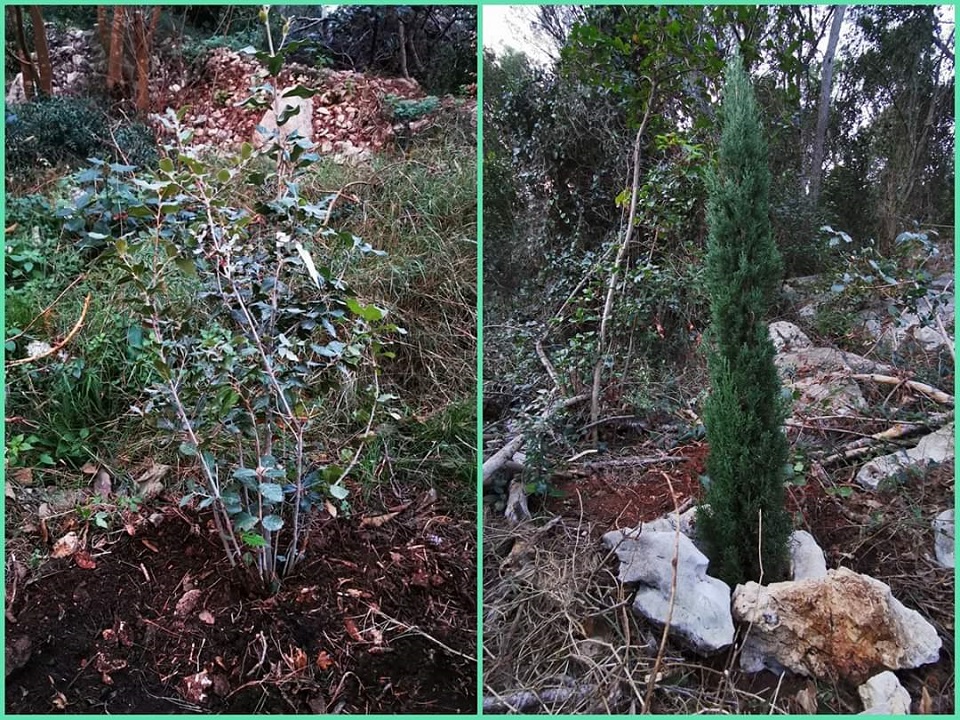
Green Guerrilla | Facebook
Are you planning to plant trees in large areas or just a symbolic number? How many trees have you planted so far?
That will remain our secret.
Will you respond to Mirko Rušić's invitation to plant trees when he officially begins the afforestation project?
We will not, because we do not want to work with a person who is unskilled, uneducated and unqualified to perform forestry work and, above all, a person who participated in the illegal felling of more than 20,000 Marjan trees.
We will only respond to an invitation to plant trees from an authorized forester. That person must stand up for afforestation, put his name behind it, and be responsible for all forestry efforts spanning the entire Marjan Forest Park protected area, which has already been slated for afforestation by the spatial plan and management program. Well, Marjan has been without a major forestry planning document for a year now. Should we be expecting an invite from someone who we can thank for putting Marjan in this situation?
You say that you are doing this "in defiance of those who would build and not plant on Marjan." Do you think that they are really trying to destroy the forest so that apartments and hotels will pop up on Marjan?
It’s not a matter of that we think. Parts of Marjan Forest Park have already been irreversibly destroyed by the unplanned and illegal construction of hotels and apartments, and now there are plans to build new cafes. Recent changes to spatial plans have been announced and who knows what else is happening in Kašuni, Kaštelet and Prva voda.
It has been officially confirmed that 75 buildings have been illegally built in this protected area, part of which is being used for apartments. There won’t be any peace while there are construction sites in the park forest, illegal construction continues, and the commercialization of Marjan is put ahead of its protection in the minds of those responsible.
How would you respond if someone started to harvest the trees you planted?
Trees cannot harm anyone, so destroying them would mean that they want war with well-meaning Split residents. If they want war with residents, they will have one, and a bigger tree will replace every tree that is removed. We will also make sure that the news of this behavior is spread beyond Croatia’s borders. This is at a critical time when the whole world is working on afforestation due to climate change, which has occurred due to the destruction of forests.
WHO IS PLANTING TWO TREES THIS EARLY
After the Aleppo pine, it was time to plant an indigenous oak and there was also a spot for a cypress. In view of yesterday's news story RTL Danas, we would like to address the statements of Mirko Rušić, President of the Marjan Commission, Deputy Coordinator of the Crisis Staff, and President of the Governing Board of JUPŠ Marjan:
Green Guerrilla documents several potential sites prior to planting, and then, in communication with forestry experts, selects planting sites for species proposed by the foresters themselves. Green Guerrilla, unlike the Marjan Commission and the Crisis Staff who have been left without professionals, has foresters who are happy to tell us what, where, how and when.
Increased patrols by the JUPŠ Marjan rangers are welcome. Perhaps they will now notice the illegal construction, pyromaniacs and other problems in Marjan, which have passed under their radar so far. The trees will continue to sprout either by our own hands or naturally, and no one can claim that any new tree is not part of a plan or program because we’ll remind them of the management program and afforestation plan.
It is a shameful for the team, held responsible by the State Forestry Inspectorate for devastating this forest, to deliberately delay the afforestation process as an election campaign nears. Greetings from the Green Guerrilla. While you p*** we will continue to plant. If you love Marjan get rid of the f****** construction sites in Marjan Forest Park rather than condemning and trying to find us.
Check out our Lifestyle page for more information on efforts (legal and illegal) to protect the environment in Croatia. Updates on Green Guerrilla's activites can be found here.
Split Tourist Board Announces New Record: Nearly One Million Arrivals in 2019
January 4, 2020 - The Split Tourist Board announces yet another record year.
Not surprising, Split has ended 2019 with new records. Namely, Splitski Dnevnik reports that in December, Split hosted a record-breaking 17,000 guests, up 19 percent on arrivals and with 37,800 overnights, an incredible 17 percent increase over the previous year. As many as 10,426 foreign tourists (20 percent more than last year) visited Split in the final month of 2019, confirming its attractiveness in all seasons. Among the international visitors to Split in December, most guests came from Asia and Bosnia & Herzegovina, but also Slovenia, Austria, Germany and the United States.
“Advent events, numerous exhibitions, manifestations, entertainment and cultural events and the spectacular New Year's Eve celebration, which has been the most popular in Croatia for a decade, are the reasons for visitors to Split in December, which brought excellent tourist results. We are particularly pleased with the significant increase in the number of foreign guests in Split this year, which was two thousand more than last year. Also, 6,500 Croatians chose to visit Split in the last month of the year, which is a thousand more than last year, and confirms the popularity of Split and its offer among citizens from all parts of Croatia,” said the Split Tourist Board.
Tourist figures for the whole of 2019 in the city of Split have never been better as tourist traffic reached nearly one million arrivals (943,907) and 2.75 million overnights. With that, Split has registered a 9 percent increase in guest arrivals and overnight stays throughout 2019, which is one of the largest in Croatia at the year-round level.
The largest number of foreign guests in Split in 2019 were US citizens (105,000), followed by Britons (94,000), then the Germans, French, Australians and Italians. In 2019, 75,000 Croatian citizens chose Split as their holiday destination.
“We are particularly pleased by the fact that guests stayed in Split for an average of three days, making Split one of the most successful city-break destinations, since according to UNWTO, cities in Europe have an average stay of 2.4 days, which Split's offer exceeded,” concluded the Split Tourist Board.
To read more about travel in Croatia, follow TCN’s dedicated page.
Over 128 Million Euro for Split-Solin Water Utility Infrastructure Upgrade
ZAGREB, January 3, 2020 - The European Commission approved on Friday an investment from the Cohesion Fund worth more than 128 million euro to modernize the water and sewerage infrastructure of the Split-Solin agglomeration.
The project will provide four thousand people with high-quality drinking water and 25,000 inhabitants with sewerage service.
Water is one of our most valuable resources, but not everyone has equal access to drinking water. Thanks to this EU investment Croatian citizens will be able to use water sources more effectively, guaranteeing high-quality drinking water and cleaner waste water, which will ultimately lead to less sea and groundwater pollution, said Cohesion and Reforms Commissioner Elisa Ferreira.
In addition to the environmental benefits, the water and sewerage infrastructure modernization will boost the local economy by expanding tourism, the main economic activity in the area. By implementing this project, the Split-Solin agglomeration will align itself with the EU drinking water and urban waste water directives, the Commission states.
The project of Split-Solin water utility infrastructure improvement consists of the construction of a water supply, drainage and sewerage system and covers the area of the City of Split, the City of Solin and municipalities Klis, Dugopolje and Podstrana.
More Split news can be found in the Lifestyle section.
Gastroadvent at Hotel Salona Palace Explores Flavors of Roman Cuisine, Rosemary, and Goat Cheese
December 22, 2019 - The fourth Gastroadvent Sunday was held on December 22, 2019, at Hotel Salona Palace, inside the Tusculum restaurant in Solin. This time, rosemary, goat cheese, and print media journalists were in the Advent spotlight.
Gastroadvent is a unique manifestation that fuses nutrition, gastronomy, and tourism while highlighting some of Split’s favorite restaurants on the less busy days of December. For the past ten years, the event has promoted the Mediterranean diet and has left a mark through its work on Mediterranean ingredients.
Thus, every Sunday of December, valuable hosts, patrons, partners and journalists gather to honor not only the light they bring to Split, but also to recognize the integral ingredients found in the Mediterranean region.
And this year, the central ingredient of Gastroadvent is invaluable to the city of Split.
Namely, rosemary is a fundamental part of the Mediterranean diet. It is originally from Europe and has been used since ancient times when students decorated their heads with rosemary wreaths, thinking that it has a beneficial effect on memory. Rosemary leaves and the essential oil obtained by distilling leaves are officially medicinal according to European regulations. Rosemary leaf contains natural phenolic compounds and is therefore considered medicine and a spice. By its antioxidant properties, it is the most potent food. It grows on rocky soil, withstands salt and high temperatures, and its habitat is carbonate rocks.
Rosemary could not exist without its home, stone. The same stone that Diocletian's Palace is made of, which was protected 40 years ago by UNESCO. This year's Gastroadvent wreath is made of stone and was crafted by the students of the Stonemasonry School in Pucisca, Brac, which boasts 120 years of existence.
Furthermore, goat cheese is higher in nutrients than all other cheeses. Last year, archaeological excavations near Šibenik revealed that Dalmatia is the home of goat cheese. Namely, according to the American scientists who analyzed and found the DNA of fats in vessels during the excavation, goat cheese was produced in Dalmatia some 7,200 years ago!
Thus, on Sunday, December 22, we gathered at Hotel Salona Palace, a unique luxury resort that exudes the ancient spirit of old Salona, at the very entrance of which is located. The location has determined the charm of its content, which is a combination of ancient elegance and modern comfort, all combined with a quality and personalized service.
The hotel has 47 rooms, indoor and outdoor swimming pools, a spa & wellness center, fitness room, conference rooms, banquet and a la carte restaurant and parking, and green areas that turn it into a peaceful oasis ideal for getting away from everyday stress. What sets it apart from everyone else is the cultural and historical heritage that surrounds it and is woven through visual messages throughout the hotel.
The fourth Gastroadvent candle was lit by print media journalists at the Tusculum Restaurant, where all guests were offered a special gastronomic story inspired by Mediterranean and Dalmatian cuisine. The newly renovated Roman Tavern was the perfect backdrop to complete the 10th Gastroadvent in Split. Throughout the year, this restaurant offers guests a menu based solely on local and homemade food, emphasizing quality, Croatian produce and eco-farming.
The sumptuous dining table by the restaurant’s ambitious chef was inspired by exploring Roman cuisine, goat cheese and, of course, rosemary. The menu included Dalmatian pašticada with homemade gnocchi and rosemary, filet of lubin fish with bacon and goat cheese, grilled vegetables with goat cheese, and roast veal in wine and rosemary.

Dario Stipaničev
The menu expanded into stuffed peppers with goat cheese, chicken fillet with white wine and rosemary, baked potatoes stuffed with goat cheese and rosemary, a Mediterranean pogača and classic Dalmatian cod (or bakalar).
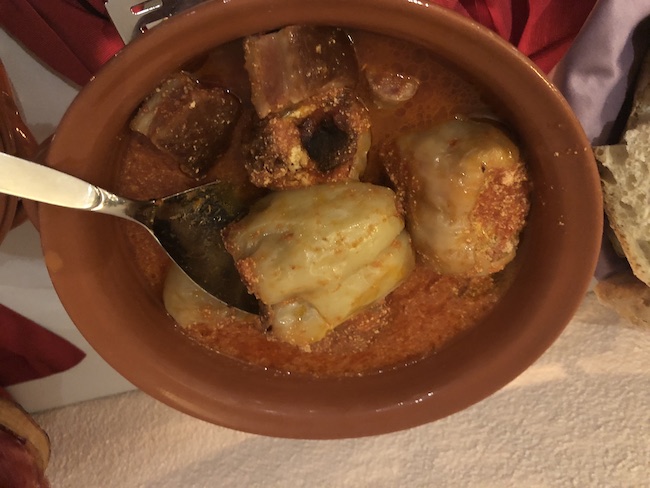
Dario Stipaničev
For dessert, there was a fresh goat cheese pie, while the chef displayed an assortment of rosemary cookies and cakes.
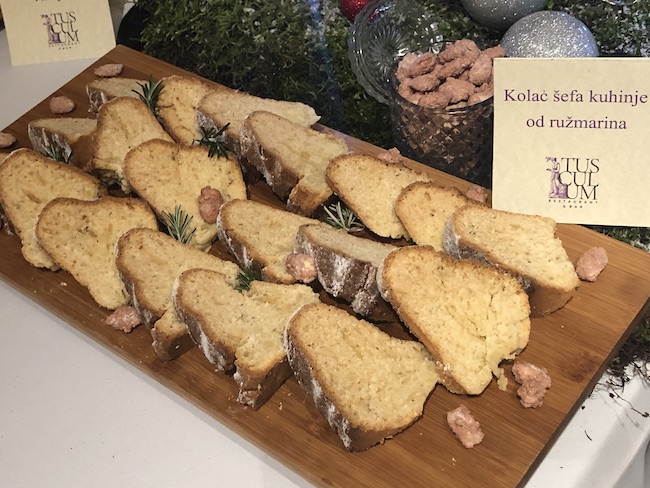
Dario Stipaničev
All dishes were paired with Plenković wines from Hvar and the Kaštela Crljenak Vuina.
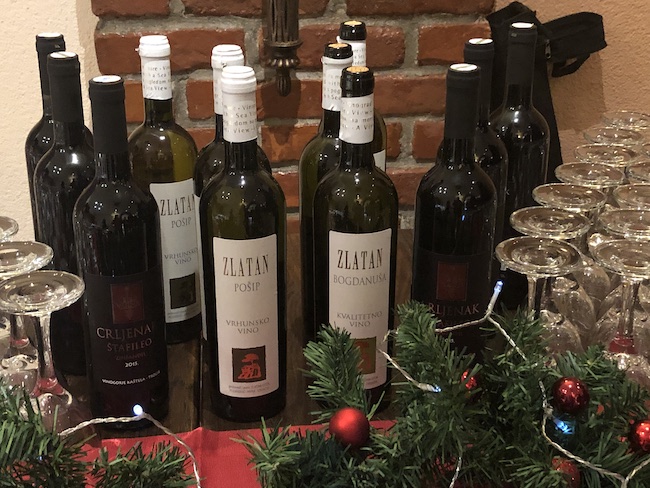
Gastroadvent is held every Sunday of Advent at a different location in Split.
To read more about lifestyle in Croatia, follow TCN’s dedicated page.
Split - Connecting Sport and Culture: City, Tourist Board, Hajduk and More Present EU Project
December 20, 2019 - An EU project in Split foresees a Poljud Museum, Hajduk Interpretation Center, new Poljud stadium roof and better stadium accessibility, as well as sports and cultural routes throughout the city.
Dalmacija Danas writes that a meeting was held with representatives of the City of Split, HNK Hajduk, the Split Tourist Board, Sports Facilities, RaST Development Agency and the Naš Hajduk Association with representatives of Kocka d.o.o. and Osam d.o.o., as part of the EU project "Split - A City Connecting Sport and Culture".
At the meeting, they presented the elaborated project technical documentation, that is, the museum concept and establishing the future Poljud Museum and Hajduk Interpretation Center, which will cover 2.323 m2 on three floors within the Poljud Stadium, below the eastern stand.
At the beginning of the meeting, Deputy Mayor Nino Vela welcomed all present and thanked everyone for their dedicated work and cooperation.
On behalf of the International and EU Projects Office, Radojka Tomasevic welcomed everyone present and informed the attendees about the project implementation and project documentation, which was prepared during the previous project implementation. She emphasized the complete project documentation for the reconstruction and rehabilitation of the Poljud Stadium roof, conserving the base of Stadium, as well as the necessary rehabilitation projects throughout the Stadium, which include ensuring accessibility for persons with disabilities.
Documentation was also developed to establish sports and cultural routes that would link locations from Bacvice, the Firule Tennis Courts, and the Basketball Hall at Gripe, to the Holy Trinity Church at Poljud, the pools and stadium at Poljud, the Ancient Port at Spinut, the pools of Mornar and Jadran, the POŠK port, the Olympic trail on the West Coast, the Ad basilicas Pictas sites, the old Hajduk stadium at Stari Plac, the Croatian House building at Tonciceva, and the Old Town Hall at Pjaca.
For the park at the site of Ancient port in Spinut, a conservation base, a study of the greenery, the architectural design of the educational park, and the main architectural design of the interpretive center - a pavilion in the Scientific and Educational Ancient port park (museum and execution project) were made.
The Strategic Branding Plan of the Split Integrated Program as a City of Sport and Culture, as well as the Feasibility Study and Cost-Benefit Analysis of the Split Integrated Program as a City of Sport and Culture, will be finalized by the end of the project.
Special thanks were given to project manager Hrvoje Akrap and project coordinator Ana Jerkunica for their dedicated work in the implementation of the project from the very beginning.
Designer Marko Barisic and project manager Jelena Devcic from the company Kocka d.o.o., and Darko Babic, director of Osam d.o.o., presented in detail the museum solution of the entire space of the Poljud Museum and the Hajduk Interpretation Center.
Thus, the Poljud Museum and the Hajduk Interpretation Center plan to offer visitors a range of new facilities using state-of-the-art technologies and multimedia equipment (9D) to create an experience and interpretation of cultural heritage and sports, presenting to the general public a valuable architectural and constructive solution for the Stadium, which is also individually protected immovable cultural property, entered in the Register of Cultural Property of the Ministry of Culture of the Republic of Croatia, in the category of profane architectural heritage, but also with the rich history of Hajduk.
All present expressed their satisfaction, from the Deputy Mayor, Nino Vela, the President of the Management Board of HNK Hajduk, Marin Brbic and his associates to representatives of the Tourist Board, the public institution Sports Facilities and the Naš Hajduk Association, emphasizing that the project will surely provide a new, unique tourist offer and product based on Split's underused history of sports and culture.
It is a considerable task for everyone to provide the means to implement all the planned activities as soon as possible, from the reconstruction of the stadium roof for which project documentation has been prepared, as well as necessary remediation projects and ensuring accessibility of the entire stadium to persons with reduced mobility, to establishing sports and cultural routes at various localities in the city, and branding Split as a city of sport and culture.
Recall, the EU project Split - City Connecting Sport and Culture, has been implemented since December 1, 2016, until December 31, 2019. The project developer is the City of Split, and the project partners are the Split Tourist Board and the Split Sports Facilities public institution. The total value of the project is HRK 6,392,000.00, of which the grant amount is HRK 4,999,822.40 financed by the European Regional Development Fund.
To read more about lifestyle in Croatia, follow TCN's dedicated page.
Fit4Work Project: Split Holds First Concierge Training for Disabled Tourists in Croatia
December 20, 2019 - About 10% of tourists have some disability, though their specific needs are not adequately recognized in the hotel industry. Thus, Fit4Work organized a concierge training for disabled tourists in Split, which was the first of its kind in Croatia.
The Tourism and Hospitality School of Split has implemented another major project this year. Namely, the Fit4Work project has been designed by the school and is aimed at training the long-term unemployed people over 54 years of age, people with disabilities, and young people who were not previously connected with the hospitality and tourism industry.
The implemented programs related to the professions of an assistant chef, guest waiter, guest confectioner, bartender/barista, and one particular specialization - hotel concierge for disabled people. The latter was also the most demanding as it lasted 280 hours. The Fit4Work project involved 45 unemployed people, with the implementation lasting 20 months. In order to ensure its quality, 12 teachers from the Split Tourism and Hospitality School, two mentors from “Bluesun - Hotel Company Tucepi”, two mentors from the Hotel “Cornaro” and a representative of the association for inclusion “Lastavica” participated in the project.
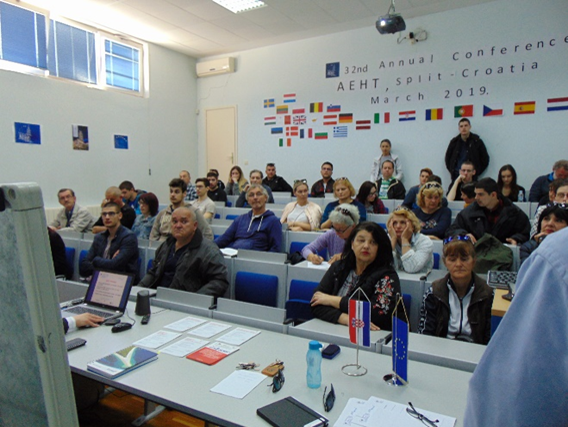
The hotel concierge for disabled people was held in Croatia for the first time:
“About 10% of travelers and tourists in the world are persons with some kind of disability, but their specific needs are not adequately recognized in the hotel industry,” explained the project manager Slaven Skrabic, a professor at the Split School.
“Five people were educated through this program, which we conducted in collaboration with the Cornaro Hotel in Split. Tourism professionals need to think about the needs of people with disabilities. For example, when a guest at a hotel requests a personalized tour of the Diocletian's Palace, the hotel concierge in that situation contacts an outside agency, a guide greets the guest at an agreed location, and the tour begins - but what about when a person in a wheelchair arrives? In this case, the concierge can not only leave the guest to the guide, but will first meet with the guide and together determine the route of the tour, ensuring that an adequate vehicle arrives for the guest, that they go to locations that are not too crowded, and there are no architectural barriers in the way,” explained Professor Skrabic.
During the study trip to London, the mentors had the opportunity to see how the system works there. In England, in particular, awareness of the importance of employing people with disabilities is higher, entrepreneurs do not have benefits, but they see the employment of people with disabilities as an investment in society. Thus, it is necessary to invest in raising the awareness of the importance of employing vulnerable groups for it to grow in our society over the years.
“It is necessary for at least one member of the hotel staff to be educated on this topic. Concierge training for people with disabilities provides very concrete knowledge with many practical examples and we continue to implement it in our school,” concluded project manager Slaven Skrabic.
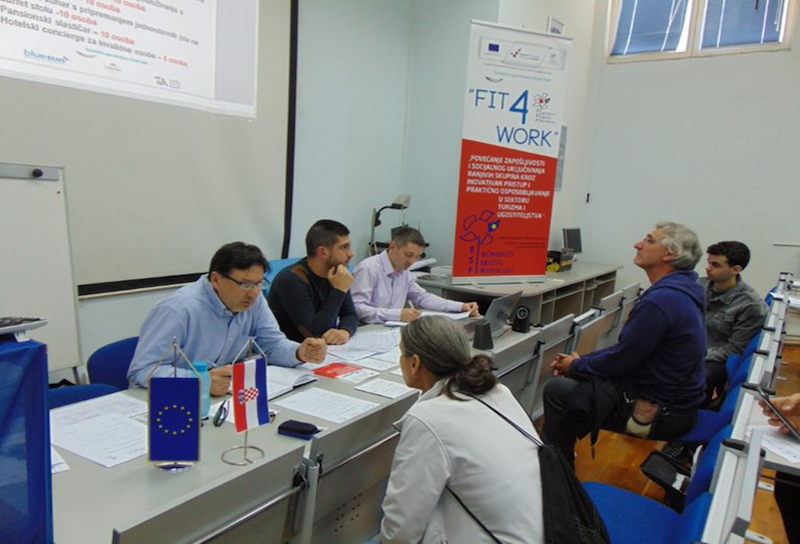
The practical part of the four-way education, i.e., the bartender/barista and the assistant waiter, chef and confectioner, were done by the project participants at the Bluesun Hotel Alga in Tucepi:
“Our impressions are excellent. We were pleased to participate in including vulnerable groups in the labor market. We presented the students with the hotel part of the service and the necessary professional skills to gain direct experience of working in a real, day-to-day business. Participation in such projects is not only important to companies in the context of CSR, but is a general advantage for the entire Croatian economy,” explained Filip Benjak, Career Development Manager at Bluesun Hotels.
The Fit4Work project ultimately resulted in employment in this sector for more than half of the 45 trainees within a few months. Much emphasis has been placed on digital and distance learning, which is why e-learning platforms have been designed and built to help participants stay in touch with mentors and work on their training after the end of the project.
The value of the Fit4Work project is €1,948,063.00 and is fully funded by the European Union through the European Social Fund.
To read more about travel in Croatia, follow TCN’s dedicated page.
Split Adds Four New Nextbike Public Bicycle Stations
December 19, 2019 - The City of Split is richer this week thanks to four new stations within the Nextbike public bicycle system.
Namely, Splitski Dnevnik writes that 32 new bikes (12 electric and 20 classic) will be available to citizens in addition to the existing ones. New stations have been set up at Zvončac (Ivan Meštrović Promenade), at the Marko Marulić Library (Ulica Slobode), at Vukovarska Street (Hygienic Institute) and Pazar (Poljana kneza Trpimira by the Bishop's Palace).
The total value of this investment is 700,000 kuna, excluding VAT, financed by Split Parking. It is a continuation of the investment in the public bicycle system after eight stations were set up this summer with 50 bicycles - 20 electric and 30 classic.
The ever-increasing numbers also confirm the need to set up new stations. Since the system was implemented in mid-July until the end of November, the citizens of Split have rented bicycles 7943 times. October and November thus saw an increase compared to September with over 2000 rentals in each month, of which October was a record high with 2,766 rentals, an increase of almost 50 percent over September.
Despite a bleak November, which saw over 20 rainy days, 2291 rentals were made. November also saw the highest daily number of public bicycle rentals - namely, 156 of them.
It is important to note here that this is mostly about local users. Data on the number of rentals realized shows that as much as 75 percent are made by local users, which means that locals have achieved almost three times as many rentals as foreign users. In the total number of registered users, 65 percent are local and 35 percent are foreign. These ratios confirm the great interest shown by the citizens for this mode of transport, which has received an excellent response as a novelty in Split.
In addition to the number of registered users and rentals achieved, the success is confirmed by the numerous inquiries, suggestions and feedback sent by users and other interested parties. Split Parking responds to some challenges related to the Public Bicycle System in collaboration with the Nextbike operator, and their director, Ante Gustin, said that Split is one of the most successful cities in the region when it comes to the results of the public bicycle system.
"The autumn data is incredible; we are talking about new Croatian records here, especially considering that rentals begin to decline during this period due to colder weather and longer nights. I must definitely point out that it is working in a young public bicycle system, which opened in July this year and, in the shortest possible time, achieved top results.
Factors such as the topography of Split, the lack of a cycling tradition that is just being developed, the small number of bike lanes and the currently limited number of bicycles and stations, should be taken into account. I believe that the City will continue to develop bicycle paths and all infrastructure to make this service even safer and better.
Split Parking is also already working on getting new stations up and running as soon as possible. Electric bikes have made driving in Split easier and faster than ever before and citizens have recognized it very well,” said Gustin.
Split Parking said they are currently in the process of designing a study and documentation that will provide accurate analysis and an optimal number of stations to cover the entire city and provide a complete system of public bicycles. They want to make this alternative mode of transport, which is also cheaper, faster and more environmentally friendly, as accessible to citizens as possible.
"We expect the study we are doing to be completed by the end of December. Once the City of Split approval is obtained for the locations, it will proceed to launch a public tender to upgrade the system. We want to make sure that each county has at least one station and we are planning to have over 40 stations and over 200 new bikes in the next year.”
If you are still haven’t tried this system, you can find out more here. The registration is free of charge, and activating an account costs 5 kuna and is valid for the entire Nextbike system anywhere in the world, while the stated amount remains available in the user's account for all additional rides.
The cost of using the bike is 5 kuna every half hour for a classic bike or 10 kuna for an electric bike. The subscription price is 200 kuna, valid for one year, and includes an unlimited number of 30-minute rides, while the same applies for extra rides in the 'pay as you go’ format.
To read more about lifestyle in Croatia, follow TCN’s dedicated page.
Split Receives Most Modern Planetarium in Dalmatia
December 18, 2019 - The Faculty of Maritime Studies in Split opened a planetarium and student cafeteria, worth a total of 4.5 million kuna, and celebrated the 60th anniversary of that faculty.
T.portal writes that the Planetarium was opened by Marijana Kedzo Miskovic, wife of missing Captain Dino Miskovic of the Bourbon Rhode ship, which sank in the Atlantic in late September.
The planetarium and student cafeteria was built with the help of the University of Split, the Split-Dalmatia County, the City of Split, and the companies Plovput and the Port Authority of Split.
The Rector of the University of Split, Dragan Ljutic, reminded those present that this is the second planetarium in Split, in addition to the one on Mosor, adding that he thinks that rarely any city, university and Faculty of Maritime Studies can boast the same.
"I am grateful for that. You know full well that our university is recognizable, by far the best from the Czech Republic to Poland and Greece, and this is another example of how we educate outstanding seafarers. We can all be proud of what we had the opportunity to see tonight, "said Rector Ljutic.
The Dean of the Faculty of Maritime Studies, Pero Vidan, emphasized that after 28 years, Split would receive another planetarium that will serve the education of students in the subject of celestial navigation, and will be open to students of secondary and elementary schools.
He said that the Faculty of Maritime Studies has dedicated the planetarium to all seafarers who cannot be with them and their families during the holidays. He also shared that the value of the project is 4.5 million kuna.
"The role of the planetarium, according to the STCW Convention on Student Education, serves to calculate the position of the ship with the help of celestial bodies. Our students will really enjoy it, and celestial navigation will be like a game," said Dean Vidan. He also said the newly opened canteen would help raise the student standard.
The City of Split helped fund the construction of the planetarium and student cafeteria with 300,000 kuna, and Mayor Andro Krstulovic Opara said that it raises the quality of the university and the Faculty of Maritime Studies, which celebrates its 60th year. However, the tradition of maritime affairs in Split is centuries-old.
"The 800 years of documented seafaring in our city overlaps with the 60 years of the Faculty of Maritime Studies, which is certainly one of the most excellent components of our University of Split. I am proud that such cutting-edge science has been recognized around the world in the most beautiful way possible and with our help,” said Mayor Krstulovic Opara.
To read more about lifestyle in Croatia, follow TCN’s dedicated page.
3rd Gastroadvent Lights Up Andrea Nirs with TV Journalists and Scottish Desserts
December 16, 2019 - The third Gastroadvent Sunday was held on December 15, 2019, at Andrea Nirs restaurant just outside of the center of Split. This time, rosemary, goat cheese, wine from Brac, Scottish desserts and whisky, and TV journalists were in the Advent spotlight.
Gastroadvent is a unique manifestation that fuses nutrition, gastronomy, and tourism while highlighting some of Split’s favorite restaurants on the less busy days of December. For the past ten years, the event has promoted the Mediterranean diet and has left a mark through its work on Mediterranean ingredients.
Thus, every Sunday of December, valuable hosts, patrons, partners and journalists gather to honor not only the light they bring to Split, but also to recognize the integral ingredients found in the Mediterranean region.
And this year, the central ingredient of Gastroadvent is invaluable to the city of Split.
Namely, rosemary is a fundamental part of the Mediterranean diet. It is originally from Europe and has been used since ancient times when students decorated their heads with rosemary wreaths, thinking that it has a beneficial effect on memory. Rosemary leaves and the essential oil obtained by distilling leaves are officially medicinal according to European regulations. Rosemary leaf contains natural phenolic compounds and is therefore considered medicine and a spice. By its antioxidant properties, it is the most potent food. It grows on rocky soil, withstands salt and high temperatures, and its habitat is carbonate rocks.
Rosemary could not exist without its home, stone. The same stone that Diocletian's Palace is made of, which was protected 40 years ago by UNESCO. This year's Gastroadvent wreath is made of stone and was crafted by the students of the Stonemasonry School in Pucisca, Brac, which boasts 120 years of existence.
Furthermore, goat cheese is higher in nutrients than all other cheeses. Last year, archaeological excavations near Šibenik revealed that Dalmatia is the home of goat cheese. Namely, according to the American scientists who analyzed and found the DNA of fats in vessels during the excavation, goat cheese was produced in Dalmatia some 7,200 years ago!
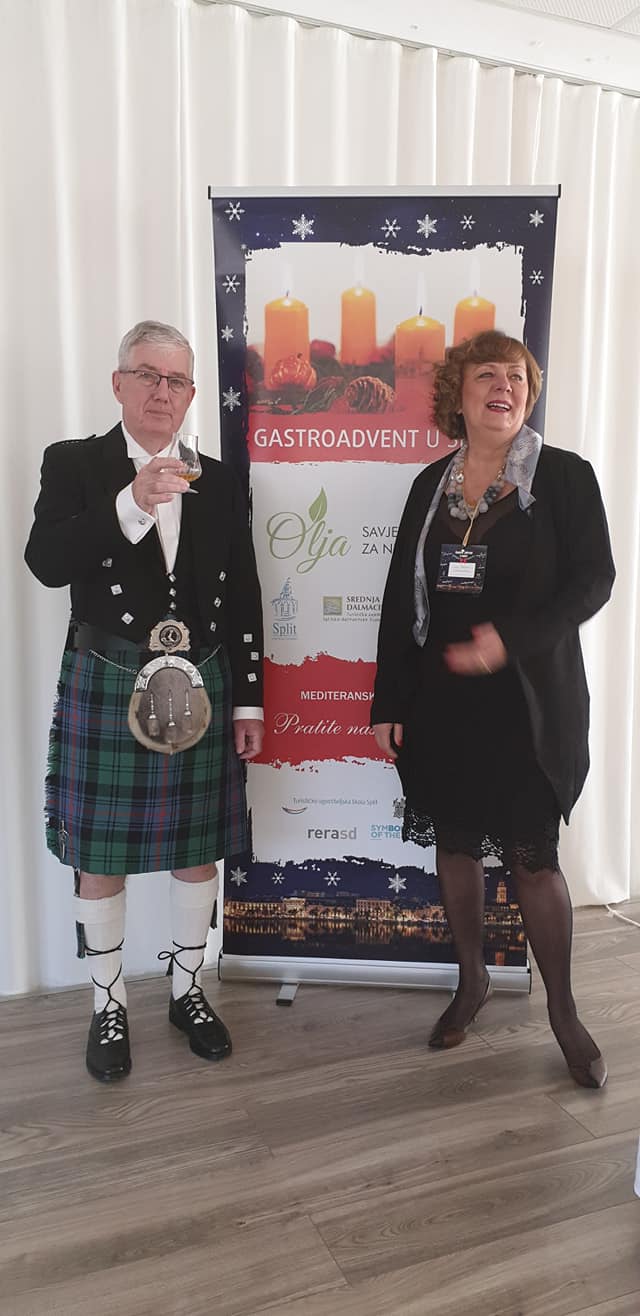
For the third Gastroadvent Sunday, the delectable table was the work of the Andrea Nirs restaurant staff - and this specialty this time was the traditional Scottish recipes by Kenneth Armstong.
All guests were greeted with a welcome drink ‘Ginto rosemari’, which was followed by stuffed mushrooms with avocado and goat cheese, zucchini strips stuffed with goat cheese, aubergine and eggplant in a salad flavored with aromatic herbs, anchovies, red onions, bay leaves, rosemary, olive oil, garlic, bakalar, bread with potatoes and rosemary, and a beautiful focaccia.
For the warm appetizers, guests enjoyed pork medallions with aromatic butter, potatoes, pumpkin, onion, bacon, and rosemary, ‘frikando’ stuffed with carrots, scallions and bacon in a spicy sauce with rosemary and homemade gnocchi, and chicken rolls stuffed with vegetables and bacon in an aromatic sauce.
Traditional Scottish desserts and whisky were the highlight of the day, made by Scotsman in Croatia, Kenneth Armstrong. On the dessert table, you could find Christmas cake, shortbread, fruit mince pies and rosemary butter biscuits. And, of course, it wouldn’t be complete without the perfect digestif - Scottish whisky.
With the support of the Bol Tourist Board, representatives from the Bol High School were also in attendance, with dishes from their book „Divlji pijat“.
And for the wine, Stina Winery from Brac stole the show.
Gastroadvent is held every Sunday of Advent at a different location in Split. Total Split will be reporting all December long.
To read more about lifestyle in Croatia, follow TCN’s dedicated page.


